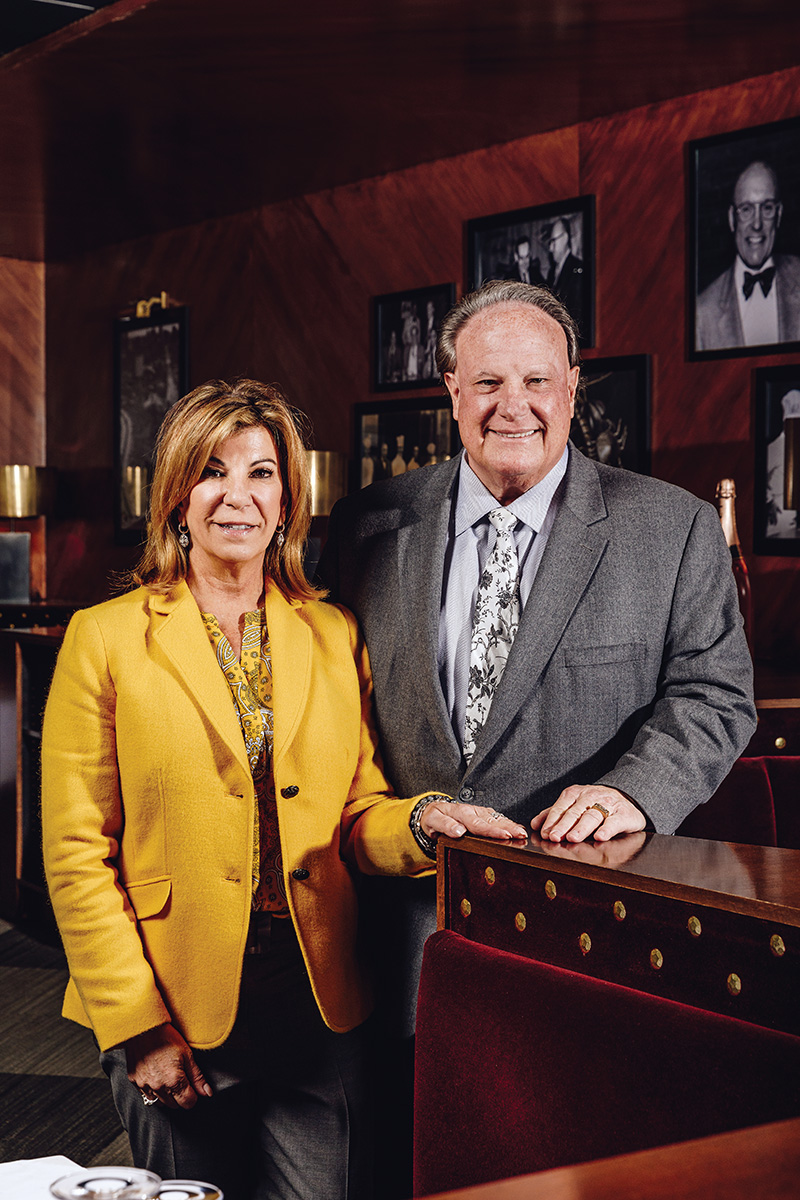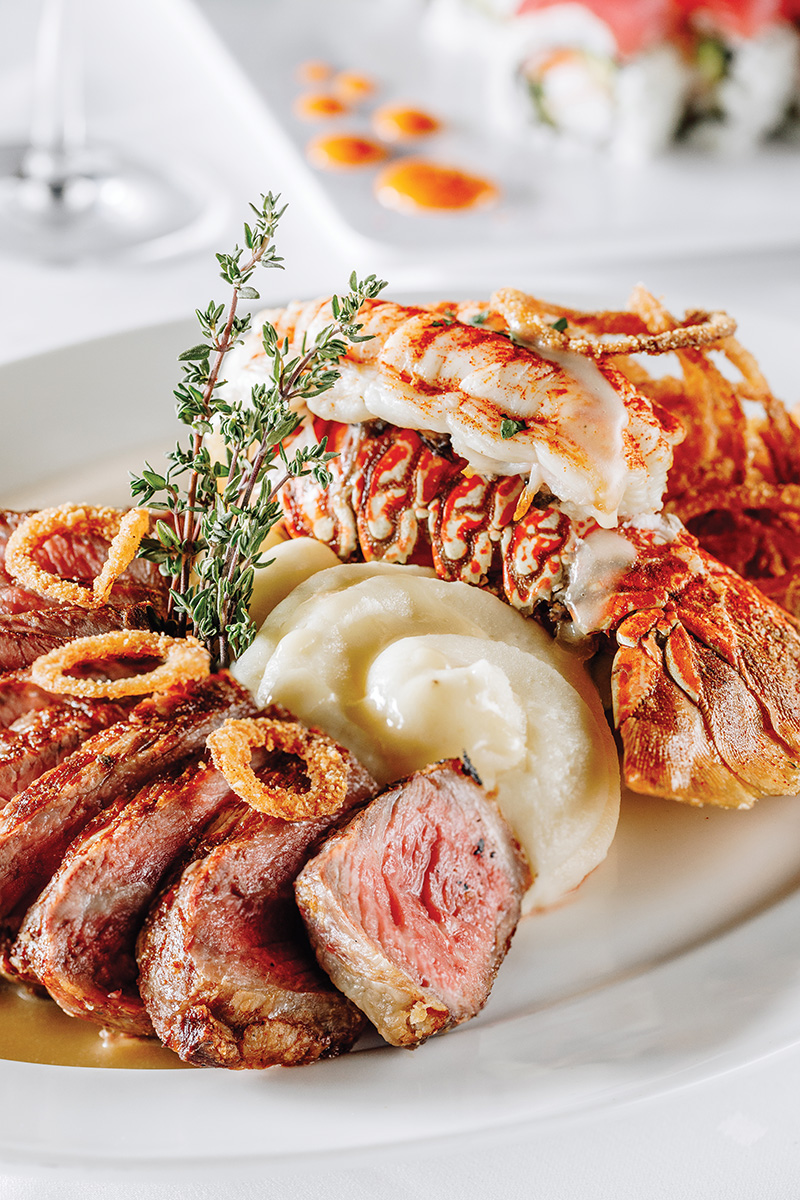
The Joe Vicari Restaurant Group made headlines for a number of reasons last fall. In September, the group announced a January opening for The Statler Bistro, a French-American restaurant and market at the highly anticipated City Club Apartments development in downtown Detroit. In October, it issued a press release detailing the addition of three new local restaurants to its portfolio — with 25 eateries now under its umbrella, JVRG became the largest independent restaurant group in metro Detroit. And it made headlines again in mid-November, when the family-owned business rallied troops to fight against the Michigan Department of Health and Human Services’ pandemic order suspending indoor dining for a second time.
The restaurant group best known for from-scratch pastas at its chain of Andiamo restaurants and for its succulent lobster and dry-aged steaks at Joe Muer Seafood, had pivoted quickly to adapt to the state’s first lockdown. The team curated carryout menus for both food and cocktails, launched cooking lessons with Executive Chef Jim Oppat, and later, introduced virtual wine tastings with guest sommeliers. Co-owners Joe and Rosalie Vicari, like many restaurateurs, masterminded new and untraditional revenue streams for the business.
During the five-month stint when indoor service was again permitted, the Vicaris say, the restaurants diligently operated in accordance with the Centers for Disease Control and Prevention’s guidelines. All employees were expected to wear masks and gloves at all times, tables were situated more than 6 feet apart, and temperature-scanning kiosks were even installed to prevent anyone who might have been running a fever from entering the premises — a $30,000 investment.
For the Vicaris, the renewed restaurant clampdown was difficult to reconcile, considering the extensive precautions the industry had taken for the safety of guests as well as scientific data that they felt did not justify the decision. The week Gov. Gretchen Whitmer announced the new “three-week pause” on indoor dining and some other services — between Nov. 18 and Dec. 8 — restaurants and bars accounted for 5.5 percent of reported outbreaks in the state, prompting the Vicaris to ask: What about the remaining nearly 95 percent?

According to Michigan’s outbreak reporting data, there were a total of 141 new outbreaks in bars and restaurants in the state (47 in metro Detroit) between Aug. 20 and the week of Nov. 12. In the same time span, there were at least 286 new outbreaks in Michigan K-12 schools, and 152 during social gatherings such as birthday parties, funerals, and weddings.
On Dec. 18, Whitmer announced that high schools, which had also been shut since mid-November, could return to in-person learning. Two-household gatherings as well as funerals limited to 25 people were also deemed acceptable. The ban on indoor dining, however, would be extended well into January. These decisions centered on one simple fact: Diners cannot eat or drink while wearing a mask — a key element in preventing the spread of COVID-19.
When news of the second restaurant shutdown order broke in November, restaurant owners were disheartened and angry, many unsure their businesses would survive another extended lockdown. At the Vicaris’ establishments, approximately 700 employees were laid off between March and November. The pandemic was also a contributing factor in the group’s decision to put its summertime hotspot Brownie’s on the Lake up for sale, and the Vicaris predict they will have no choice but to close other locations if severe restrictions on indoor dining are prolonged.
Readying for Battle
“How can it not be your first instinct to say, ‘There’s no way we’re going to shut down again — our businesses won’t survive,’ ” Rosalie asks. Initially, in a letter shared with fellow local restaurant owners, the Vicaris encouraged restaurateurs to defy the order if the “pause” was extended past Dec. 8. Then, Joe says, calmer heads prevailed. “We made a decision that it wasn’t the right thing to do. You’d lose your liquor and food licenses, and it would cost thousands of dollars to get them back.” (In fact, the Vicari Group soon made headlines again — for just what Joe warned other restaurateurs about. In mid-December, the state suspended Andiamo Warren’s liquor license for violating the ban on indoor dining by reportedly hosting a wedding with more than 60 guests in attendance. The Vicaris declined to comment on these reports.)

On Dec. 3, the Vicaris held a virtual meeting where representatives from more than 400 restaurants were invited to voice their concerns over the shutdown. “The message that we gave was that we need to work together with Lansing to figure out how to safely reopen our restaurants,” Rosalie says.
Based on their conversations, the Vicaris believed fellow owners would have been willing to adhere to requirements that would have allowed them to operate with limited services. Joe points to regulations in states such as Pennsylvania, where restaurateurs placed a limit on diners’ alcoholic beverages to keep guests from becoming neglectful of social distancing and other safety precautions as stiff cocktails kicked in. “There’s more protocol that we could do to stay open, and I think that restaurants would be happy to abide by those,” Rosalie says. “It’s just, nobody is listening to us.”
The Vicaris say they reached out to Whitmer’s office to present ideas that were discussed during the Dec. 3 meeting but, as of press time, they had not received a response.
Anatomy of a Restaurant Magnate
Joe Vicari, a chemical paper supplier by trade, opened his first restaurant in 1989. He credits the success of Andiamo to the late Aldo Ottaviani, a master chef he hired early on, who laid the foundation for the restaurant’s traditional Italian recipes and ultimately for the principles that guide the chain to this day.

“We have purveyors ask why we hand-make our pastas when there’s equipment that’s cheaper and quicker — and makes pasta that’s almost as good,” Joe says. “But it’s not the same. That’s why we continue the legend of Aldo, and we insist on it.” Today, there are six Andiamo restaurants in the Detroit area — and one eatery at Detroit Metro Airport — as well as an Andiamo Italian Steakhouse based in Las Vegas.
In addition to the Andiamo empire, Joe opened Joe Muer Seafood, a white-linen restaurant specializing in fresh seafood and hearty meats. Though the concept was his own, he says his wife took the brand to the next level. In 2004, Rosalie joined the group as co-owner, elevating the design and service to the level of fine dining guests experience at Joe Muer today. “I’m the queen of the details,” she says. “If there’s a spot on a glass, I’ll see it from across the room.”
It could be argued that JVRG is the type of business that will weather the storm of the pandemic and that the defiant approach the Vicaris took when the November pandemic order was announced was gratuitous. In addition to its restaurant entities, the group operates one of Michigan’s largest catering and event management companies, providing meals for the area’s biggest events, including the annual Detroit Grand Prix.

“Yes, we personally, will be fine, but this was for our employees,” Rosalie says. “We’re a very hands-on family business. We work side by side with our employees. They’re not just a number on payroll.”
She and Joe, she insists, never intended to jeopardize anybody’s health with their opposition to state restrictions. The goal was only to advocate for an industry that they care about deeply. It was for the line cooks and bussers, servers, dishwashers, and hosts who’ve lost their jobs because of the extended suspension of indoor dining.
Says Rosalie: “Anyone who thinks, ‘You guys are just worried about money,’ you don’t know us.”
|
|
|









